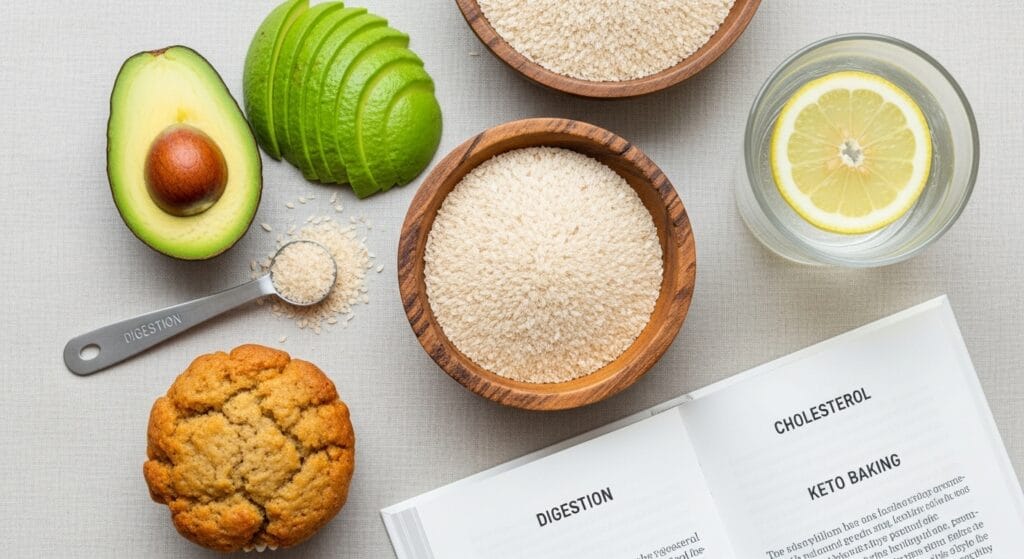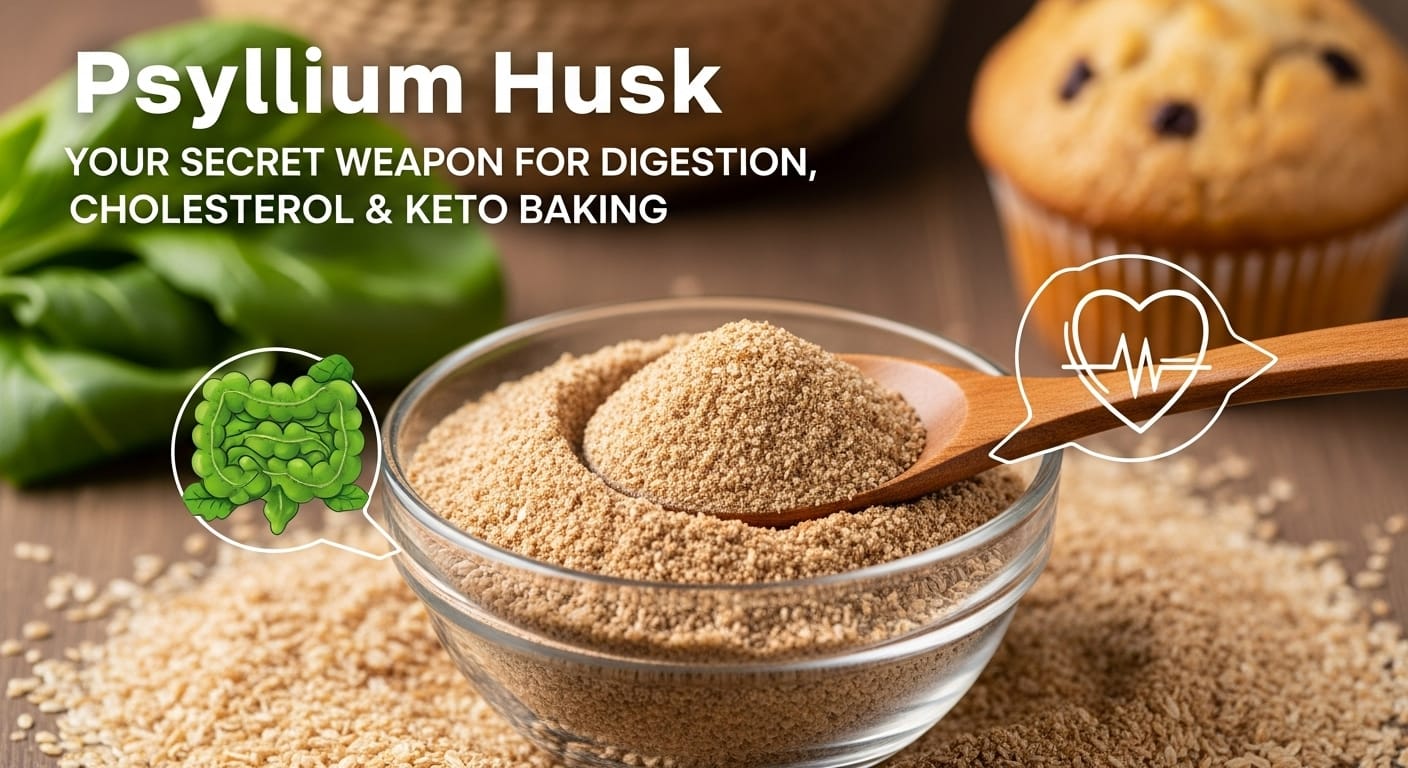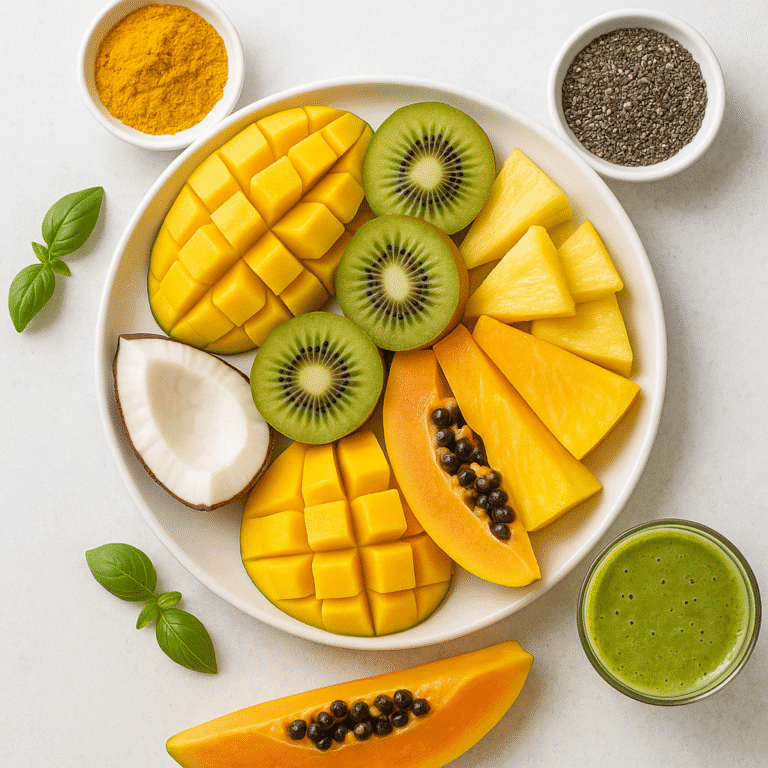Psyllium Husk: Your Secret Weapon for Digestion, Cholesterol & Keto Baking
Introduction: Meet Nature’s Digestive Dynamo
Picture this: a tiny seed husk, humble and unassuming, that transforms into a soothing gel inside your gut. That’s psyllium husk (or isabgol in Ayurvedic traditions) – a soluble fiber superstar derived from Plantago ovata plants. Unlike harsh laxatives, psyllium works gently, absorbing water to add bulk, promote regularity, and nourish your gut microbiome.
But its talents go far beyond constipation relief. From taming cholesterol to revolutionizing gluten-free baking, this ancient remedy is a modern wellness essential. Let’s dive in.
How Psyllium Husk Works: The Science of Soluble Fiber
Psyllium’s magic lies in its mucilage – a gel-forming compound that swells 10x its size when mixed with water. Here’s the breakdown:
- Step 1: You consume psyllium husk powder or capsules with water.
- Step 2: It forms a viscous gel in your gut, acting as a bulk-forming laxative.
- Step 3: This soft mass stimulates intestinal contractions, easing stool passage and absorbing excess fluid in diarrhea.
- Bonus: As a prebiotic fiber, it ferments slowly, feeding beneficial gut bacteria without the bloat of some fibers.
▶ Key Takeaway: It’s a water-soluble fiber that adapts to your digestive needs – whether you’re backed up or running too loose.

Top 5 Science-Backed Benefits of Psyllium Husk
- Constipation Relief That Works
Studies show psyllium significantly improves stool frequency and consistency. Unlike stimulant laxatives, it’s safe for daily use (just hydrate!). Dosage Tip: Start with 1 tsp powder in water, gradually increase to 1–2 tbsp daily. - Cholesterol Crusher
Psyllium binds to bile acids (made from cholesterol) in your gut, forcing your liver to use more cholesterol to replace them. Result? LDL (“bad”) cholesterol drops by up to 10% with 10g/day. - Blood Sugar Stabilizer
The gel slows carb digestion, preventing spikes. Diabetics taking psyllium see improved fasting glucose and HbA1c levels. - Weight Management Ally
By expanding in your stomach, psyllium promotes satiety (feeling full). One study found participants ate 29% fewer calories at their next meal after taking it. - Gut Garden Fertilizer
Its prebiotic effects specifically feed strains like Akkermansia – linked to reduced inflammation and better metabolic health.
How to Use Psyllium Husk: A Step-by-Step Guide
Golden Rule: WATER IS NON-NEGOTIABLE.
- Powder: Mix 1 tsp–1 tbsp in 8–12 oz water/juice. Drink immediately (it thickens fast!). Follow with another glass of water.
- Capsules: Take with 10+ oz water. Never dry-swallow!
- In Food: Add to smoothies, oatmeal, or gluten-free baking (more below).
▶ Pro Tips:
- Start low (3–5g/day) and increase slowly over 2–3 weeks to avoid gas/bloating.
- Take 30 mins before meals for appetite control, or before bed for morning regularity.
- Avoid taking medications – wait 2 hours before/after.
Psyllium Husk in Keto & Gluten-Free Baking
Psyllium is a game-changer for low-carb and gluten-free recipes:
- Why It Works: The gel mimics gluten’s elasticity and traps air, giving breads volume without grains.
- Keto Bread Hack: Use 1–2 tbsp psyllium husk powder per cup of almond/flour to prevent “eggy” texture. [Internal Link: Keto Bread Recipe]
- Gluten-Free Pro Tip: Combine with xanthan gum for chewy pizza crusts.
▶ Recipe Idea: 3-Ingredient Keto Wraps
Mix 2 tbsp psyllium powder, 1 cup almond flour, and 1 cup boiling water. Rest 5 mins, roll thin, cook in a skillet.
Side Effects & Safety: What You MUST Know
Psyllium is safe for most, but demands respect:
- Common: Gas, mild cramping (usually fades as your gut adjusts).
- Serious (Rare but Critical):
- CHOKING RISK: If mixed with too little water, it can swell in the throat. Always follow dilution instructions.
- Bowel obstruction (if you have strictures or take without enough fluids).
- Who Should Avoid:
- Those with difficulty swallowing.
- History of bowel obstructions.
- Consult your doctor first if you have: Kidney disease, diabetes, or take medications (especially blood thinners, antidepressants, or lithium).
Choosing the Best Psyllium Supplement
Cut through the clutter with these tips:
- Powder > Capsules for cost-effectiveness and baking versatility.
- Organic? Worth it to avoid pesticide residues in the husk.
- Read Labels: Avoid added sugars, artificial colors, or fillers. “100% Pure Psyllium Husk” is ideal.
- Color Matters: Golden husks are less processed than darker varieties.
▶ Top Pick: Organic Indian psyllium husk powder (like NOW Foods or Terrasoul) – minimally processed and lab-tested.
Psyllium vs. Alternatives: Which Fiber Wins?
- Vs. Metamucil: Psyllium is the active ingredient in Metamucil, but pure husk has no additives/sweeteners.
- Vs. Chia/Flax: Psyllium forms a stronger gel (better for IBS-D or baking), while chia/flax offer omega-3s and insoluble fiber. Use both for balance!
Conclusion: Is Psyllium Husk Your Gut’s New Best Friend?
Psyllium husk isn’t just a constipation fix – it’s a heart-healthy, blood sugar-balancing, keto-baking powerhouse. But its superpowers demand responsibility: hydrate aggressively, start slow, and consult your doctor if you’re unsure. When used wisely, this unassuming husk can transform your gut health, one soothing gel at a time.
Ready to try? Grab pure organic psyllium husk powder, mix with water, and toast to happier digestion!
FAQs
1. What is psyllium husk used for?
Psyllium husk is primarily used as a natural soluble fiber supplement for:
- Digestive health: Relieves constipation (bulk-forming laxative) and diarrhea (absorbs excess water).
- Cholesterol management: Lowers LDL (“bad”) cholesterol by binding to bile acids.
- Blood sugar control: Slows carbohydrate absorption, beneficial for diabetics.
- Weight loss: Promotes fullness, reducing calorie intake.
- Keto/gluten-free baking: Acts as a binding agent in low-carb recipes.
Pro Tip: Always take with plenty of water to avoid choking or blockages.
2. What is psyllium in Urdu?
In Urdu (and Hindi), psyllium husk is called اسپغول (pronounced “Ispaghol” or “Isabgol“). It’s widely used in South Asian traditional medicine (Ayurveda/Unani) for digestive issues.
3. Is psyllium husk the same as Isabgol?
Yes! “Isabgol” (اسپغول) is simply the Urdu/Hindi name for psyllium husk. Both terms refer to the same product—the husk of Plantago ovata seeds.
Note: Some brands market “Isabgol” with added flavors (e.g., rose, orange), but pure psyllium/isabgol has no additives.
4. Is it safe to take psyllium husk every day?
Yes, if used correctly:
- Dosage: 5–10g daily (1–2 tsp) with 8+ oz water per dose.
- Start slow: Begin with 3g to minimize bloating/gas.
- Critical: Never take dry, and drink extra water throughout the day.
Who should avoid daily use?
- People with bowel obstructions, difficulty swallowing, or certain medications (consult a doctor first).
Studies show daily use is safe long-term for most adults and enhances gut health.







